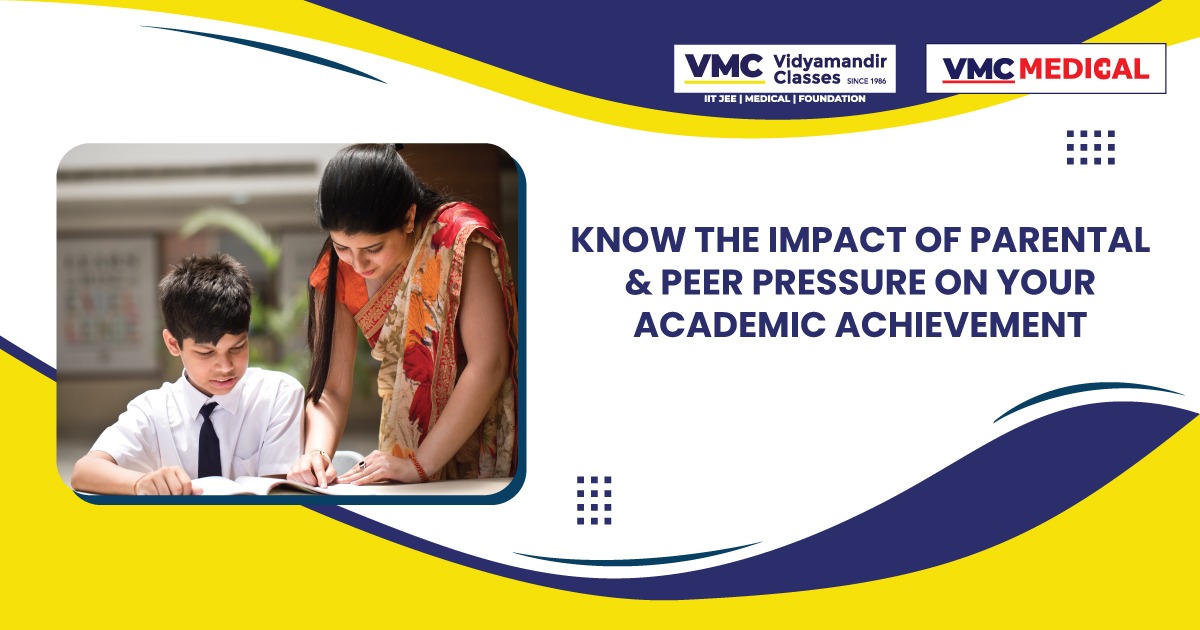Know the Impact of Parental & Peer Pressure on Your Academic Achievement!
 Posted On
Posted On
958 total views, 1 views today
A variety of influences determine each person’s behavior and ideas. When it comes to influencing a person, parents and friends typically have the most impacts. As a youngster gets older, the intensity of peer pressure and parental expectations increases.
Being a central aspect of student life, academics are subject to strong parental and peer influence. Parents frequently have high expectations for their kids’ academic success. Similar to this, a student’s peer group and choice of friends might have an impact on their academic performance.
Pressure and expectations can have negative implications. However, each has a reasonable number of advantages and disadvantages. For instance, when parental expectations are positively communicated, they can support kids in maintaining their resolve through times of self-doubt. However, having unreasonably high expectations might result in stress, breakdown, and failure in the end. Peer pressure is also only seen as a means of getting kids to participate in harmful activities like smoking and stealing. However, the correct peer group can motivate pupils to perform their academic work more effectively and foster their social skills.
Overall, when handled properly, parental expectations and peer pressure can have more good consequences than negative ones.
How to set the right Expectations!
Parents obviously play a significant impact in their children’s academic success, but it’s important to distinguish between having high expectations and having excessive expectations. According to a recent study, children perform better academically when their parents have high ambitions. The performance, however, suffered when these goals were exceeded.
Of course, parents only want the best for their children. But how this is said can really make a difference. The secret is to recognize the child’s potential and inspire them appropriately. Positive expectations can be less effective if youngsters are told to achieve goals without being told why or what they mean. The potential to learn, expand perspectives, and find hobbies that can be pursued in the future should serve as the drive rather than a grade on a report card.
Setting expectations is only one part of parents’ efforts to support their children’s academic success. The second half is giving the right support to meet such demands. Parents may help their children learn by reading to them, participating in enjoyable educational activities, and working together to solve problems. Children should be actively listened to in order to help them open up about their aspirations, passions, and difficulties. Let kids know that you embrace them regardless of their successes or failures and that their self-worth is not based on academic aspirations.
How parents help children combat Stress
Similar to teachers, parents are crucial in helping children cope with stress. This is how:
- Parents should encourage their children to think positively and lead healthy lives. Stress can be significantly reduced by living a healthy lifestyle and adopting appropriate eating and sleeping practices.
- Parents should always accept their children’s flaws and faults, whether they are in school, athletics, or any other endeavor.
- When a student is suffering dread or anxiety, parents should take the time to communicate and address the issues. They must teach their children that failure is a necessary part of achievement.
- Parents should constantly make an effort to highlight the student’s strengths and positive traits.
Combating Peer Pressure
Students tend to spend more time with their peer groups as they become older and are more susceptible to their influence. These peer groups are typically selected based on the things they have in common. Although your child may have a common interest with the group, it’s vital to keep in mind that they may also have other, more distinct interests. Students can acquire exposure and build open-mindedness while learning about themselves by joining a club like this.
When we hear the word pressure, we tend to assume that students are frequently coerced into doing something against their will or that they are persuaded to believe or act contrary to their natural tendencies. While there have been instances where children have been made fun of for being intelligent or performing well in school, there may also be pressure to perform better and be more responsible members of society. Consider the possibility that your youngster is surrounded by peers who consistently do their schoolwork on time. They might be inspired to follow suit by this.
How a student handles pressure is the key. As parents, you can assist children in identifying it and resolving it appropriately. Keep tabs on your kids’ friends and social circles without invading their personal space. Since student’s value peer acceptance, it is preferable to emphasize the positive aspects of peer interactions rather than the detrimental effects of peer pressure. Additionally, a student is not required to avoid unsavory company. Instead, you may instruct them on how to be a good role model for their friends.
Although parental expectations and peer pressure can seem overpowering, they can also serve as motivators for students’ general personal growth as well as their academic performance.
Final Words
There is an urgent need to address the concerns of parenting expectations and academic stress in this day and age, where a decimal point can make all the difference in a person’s life. To grasp the challenges and develop particular solutions to lighten the load on the children, everybody must work together as a cohesive team to perform deeper research and more extensive investigations.



